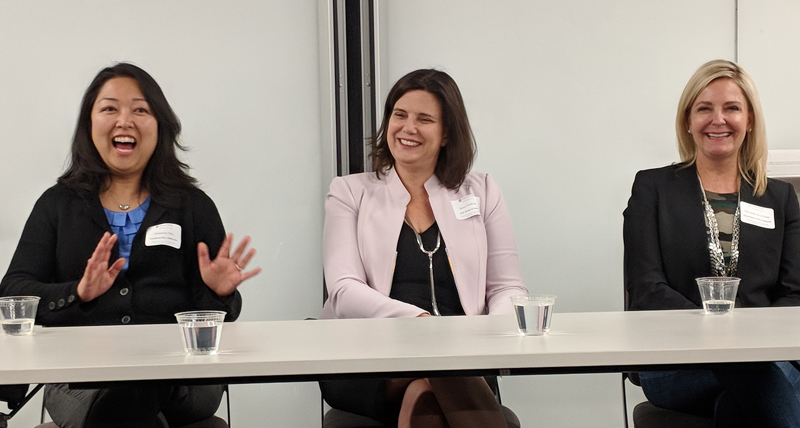By Liza Kirby
On Wednesday, November 7th, FWSF hosted an insightful and engaging industry leadership panel at the UC Berkeley Haas School of Business. Panelists included LENDonate CEO and Founder Vivienne Hsu, Hewlett Packard 3-D Printing Global Head Michelle Bockman, and Brown and Caldwell CFO Amy Fairbank. Nerdwallet Senior Associate of Business Operations Blakely Larson was a stimulating moderator. FWSF VP of Programs Sue Mazzetti welcomed everyone with inspiring remarks and news about upcoming events.

The panelists shared milestones from their career journeys and pearls of wisdom from their experience. All the panelists had worked in a variety of roles in which they developed skills, leadership, professional networks, and supporters.
As founder and CEO of LENDonate, Vivienne Hsu currently combines her investment and non-profit fund-raising experience. She majored in math as an undergraduate and later obtained an MBA and CFA. She started her career as a pension fund actuary, then pivoted to MSCI/Barra where she was a programmer analyst, developing her programming and analytical skills. Subsequently, she joined American Century as an investment analyst and moved up to co-portfolio manager. At Charles Schwab Vivienne oversaw the active equity strategies and was also lead portfolio manager for an equity hedge fund.
Amy Fairbank majored in accounting and began working as an Ernest and Young CPA. She then led the finance and accounting teams at several small insurance companies. Amy subsequently moved to Brown and Caldwell, a large environmental engineering and construction firm, where she was recently promoted from controller to CFO.
Michelle Bockman majored in mechanical engineering and began her career working as a mechanical engineer in the automotive industry to further develop her technical credentials. After five years, she transitioned to a sales role at Nikkon Instruments. Michelle next moved to General Electric, where she held various leadership roles within the Digital, Healthcare, and Industrial business units. A year ago, she moved to Hewlett Packard, heading the global 3-D printing business.
Vivienne: Be ready for anything to happen. Be nimble and adjust plans. Bosses can make or break careers. Sometimes you just need to change bosses, not firms. Recognize your worth and ask for a promotion when you feel you earned it. Summarize your promotion request and reasons in writing for your manager.
Amy: To develop a strong leadership team and align on company strategy, leaders need to experience vulnerability and learn about their peers. Don’t look for external validation of your worth; look within. Men like to self-promote more than women typically do. Know your audience and adapt. Career mistakes happen. They are not always because of you. Fail fast, and move on.
Michelle: You own your own career. The PIE Leadership development model can help advance your career.
P- Performance: excel at delivering results for your current role
I – Image: can people visualize you at the next level
E – Experience: network so that other people see and hear about what you are doing. Gain experience and make connections in different areas by asking to work on “bubble projects” in other areas. Start a women’s network or get involved in an existing one.
Sponsorship is also important to help you move from professional to executive level. Multiple sponsors, who voluntarily offer to advocate for you, are ideal. They will sing your praises and recommend you to others. If you ask someone to be a sponsor and she is unsure or does not know you that well, she may offer to be a mentor. Be grateful.
The panelists noted that as you rise on the career ladder, your focus needs to switch from doing the work to helping your team be successful — ensuring that they have the resources and skills needed. Ask your team members where they want to go in their careers. Give them direct feedback that will help them get there. Watch out for unconscious bias, from all directions, including your own.
Be true to yourself. Focus on your strengths. Recognize what you need to develop. Don’t be overly critical of yourself. Reframe mistakes as learning.
Network inside and outside your organization to build relationships with people who can advise and help on career moves.
Even as technology changed over the panelists’ careers and will continue changing in the future, the one constant is the need for connection and communication with people—manager, team members, peers, clients, suppliers, etc. Follow your passion because technology changes can be unpredictable; 65% of jobs in 2030 have not yet been created. Have fun and continue to be challenged.